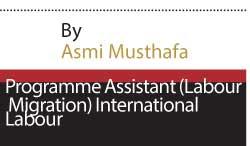19 Dec 2019 - {{hitsCtrl.values.hits}}

 In June 1986, soon after I was born, my father went overseas. I grew up in Maruthamunai, a small coastal village of about 15,000 people in the Eastern Province of Sri Lanka, part of a family of seven. My four sisters and I were all very young when my father left the country to work in Saudi Arabia, as a driver for a household. I cannot begin to imagine how my mother felt, tasked with looking after five kids without the direct support of her husband.
In June 1986, soon after I was born, my father went overseas. I grew up in Maruthamunai, a small coastal village of about 15,000 people in the Eastern Province of Sri Lanka, part of a family of seven. My four sisters and I were all very young when my father left the country to work in Saudi Arabia, as a driver for a household. I cannot begin to imagine how my mother felt, tasked with looking after five kids without the direct support of her husband.
Migrating for work was not uncommon in our village. While many worked in the fisheries sector, others migrated to Middle Eastern countries. In the early 1980’s the money they sent back home sustained the village economy, and these remittances were the cornerstone of rural development at that time. A number of my own relatives had already gone abroad to work as labourers and domestic workers. Two of my aunties and an uncle also worked in Kuwait and Saudi Arabia, so my mother was not too worried.
Labour migration is often seen as an option because the worker might lack a proper, adequate income at home that covers their living costs. In many cases, migrating to another country is a result of an aspiration to earn money for themselves and their families. But, apart from these economic reasons there are other motivating factors, such as a willingness to explore other countries and study other cultures, peer pressure, and a desire to forget about the past as part of a healing process. So, the process of migrating for work is not a simple decision but is a social phenomenon tied to many socio-cultural factors.
The term remittances refers to inflows of migrants’ income transfers (personal remittances). Over the years, foreign employment has generated substantial inflows of remittances and has contributed to the development of livelihoods, particularly among low income households in Sri Lanka. The country has worked hard to harness the benefits from migration, improve diplomatic ties and strengthen economic stability. Migration has significantly contributed to the country’s growth, both at the micro and macro levels. In 2017, remittances to Sri Lanka were USD 7.1 billion, which accounted for over 8 per cent of GDP, according to the Central Bank of Sri Lanka (CBSL). In the same year, CBSL found that remittances were the most important foreign exchange earner, ahead of apparel exports and tourism earnings.
I still remember how the re-chargeable lamp my father brought for us was a popular fixture used by our entire community. We were plagued with frequent electricity failures in the evenings and our neighbours often borrowed it during emergencies.
I wrote letters to my dad and sometimes we exchanged recorded audio cassettes. Those were times before mobile phones or the internet, and making phone calls was rare because it was very expensive. So, I would record a message on a cassette and post it to him, and he would do the same. At least a month would pass between our voice messages. Relatives hung around the village post office eagerly awaiting the sealed orange mailbag that was delivered by bus. We would wait impatiently until the Postmaster completed the formalities, opened the bag and then called us to collect the letters and parcels addressed to us.
One day, I got a letter with 10 Saudi Riyals (approximately US$3.10) sent to me by my dad. I found someone who exchanged it with me for Sri Lankan Rupees. I walked straight to a stall selling spiced cassava chips and ate mouthfuls of the savoury, crunchy snack. Back then, it was the most amount of money I had ever had in my pocket.
My father’s job was the only source of income for my family. My mother handled our finances with remarkable efficiency, saving a large amount of the money received. Then, there was no
internet banking facility to remit money to Sri Lanka from overseas. All migrant workers depended on snail mail to send cheques home. My father’s monthly income was around 1,000 Saudi Riyals which was equivalent to 15,000 Sri Lanka Rupees (US$ 310) then. Unbelievably, my mother not only managed to pay for our education but she was also able to save money to build four houses for my sisters, to be given to them when they got married, as per -local custom.My mom and dad studied only up to Grade 4 and dropped out of school when they were nine, due
to poverty. I often wonder how they learnt this level of economic management.
Growing up with a father working as a migrant worker and watching my mother judiciously manage the remittances we received, I have often wondered about other Sri Lankans who have migrant worker parents or family members. How did husbands use money sent by their wives working overseas? How did their experiences differ from mine? What are the implications for
communities?
My dad worked as a driver continuously for ten years and returned home in 1996. I had remote interactions with my dad and when he returned to stay with us, he was quite a stranger to me.
After he returned, I was able to get to know him all over again. Although they were not very good, our family finances were better than most. Now, looking at my family of well-educated siblings and seeing all of us work to achieve our dreams, I understand how he helped lift up the family by working abroad.
However, it has to be acknowledged that most workers in their destination countries face numerous challenges and difficult working conditions. The cost of migration is another factor that may put the migrant worker on the spot, using their earnings to repay debt and loans taken during the initial stage of the migration process. This could be one of the reasons that the
impact of the remittances on households cannot be seen immediately. Simply having a system in place is not enough, it must be translated into regulation, governance and monitoring to
promote safe migration processes. ILO has established the General Principle and Operating Guidelines (GPOG) for fair recruitment that clearly set out the responsibilities of the
government, enterprises, public employment services, labour recruiters and employers.The Principles and Guidelines are intended to assist ILO’s member States, partner governments,
employers’ and workers’ organisations, labour recruiters, and other relevant stakeholders to develop effective labour recruitment policies that comply with human rights and international labour standards. Action from all these stakeholders should support the transition from informal to formal recruitment practices, eliminate fraudulent and criminal practices, improve protection, and access to remedies for victims of abuse, and support preventive measures such as human rights due diligence in both the public and private sectors.
I do not know how I can show my gratitude to my migrant worker father. Many Sri Lankans are looking for decent jobs and employment abroad that would help them and their families financially. Indeed, it is a dual benefit for the country and the worker’s family.
This article is extracted and a modified version from the ILO blog article, “My father, the migrant worker”.
The ILO supports a rights-based approach to migration and works with both migrant workers and its tripartite constituents to maximise the benefits of migration for all involved.
28 Nov 2024 4 hours ago
28 Nov 2024 4 hours ago
28 Nov 2024 5 hours ago
28 Nov 2024 7 hours ago
28 Nov 2024 8 hours ago